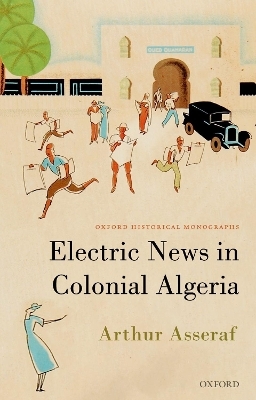
Electric News in Colonial Algeria
Seiten
2022
Oxford University Press (Verlag)
978-0-19-286401-7 (ISBN)
Oxford University Press (Verlag)
978-0-19-286401-7 (ISBN)
As Algeria became connected to international news networks during French colonial rule in the late nineteenth and early twentieth centuries, this study examines how news spread through communities and across social divides, how new media changed the communication landscape, and how surveillance by the French government played a role.
How do the things which connect us also serve to divide us? Electric News in Colonial Algeria traces how news circulated in a particularly divided society: Algeria under French rule in the late nineteenth and early twentieth centuries. It tells a different history of globalization, one which puts the experience of everyday people at the centre. The years between 1881 and 1940 were those of maximum colonial power in North Africa; a period of intense technological revolution, global high imperialism, and the expansion of settler colonialism. Algerians became connected to international networks of news, and local people followed distant events with great interest. But once news reached Algeria, accounts of recent events often provoked conflict as they moved between different social groups. In a society split between its native majority and a substantial settler minority, distant wars led to riots. Circulation and polarisation were two sides of the same coin.
Examining a range of sources in multiple languages across colonial society, Electric News in Colonial Algeria offers a new understanding of the spread of news. News was a whole ecosystem in which new technologies such as the printing press, telegraph, cinema, and radio interacted with older media like songs, rumours, letters, and manuscripts. The French government watched anxiously over these developments, monitoring Algerians' reactions to news through an extensive network of surveillance that often ended up spreading news rather than controlling its flow. By tracking what different people thought of as news, this history helps us reconsider the relationship between time, media, and historical change.
How do the things which connect us also serve to divide us? Electric News in Colonial Algeria traces how news circulated in a particularly divided society: Algeria under French rule in the late nineteenth and early twentieth centuries. It tells a different history of globalization, one which puts the experience of everyday people at the centre. The years between 1881 and 1940 were those of maximum colonial power in North Africa; a period of intense technological revolution, global high imperialism, and the expansion of settler colonialism. Algerians became connected to international networks of news, and local people followed distant events with great interest. But once news reached Algeria, accounts of recent events often provoked conflict as they moved between different social groups. In a society split between its native majority and a substantial settler minority, distant wars led to riots. Circulation and polarisation were two sides of the same coin.
Examining a range of sources in multiple languages across colonial society, Electric News in Colonial Algeria offers a new understanding of the spread of news. News was a whole ecosystem in which new technologies such as the printing press, telegraph, cinema, and radio interacted with older media like songs, rumours, letters, and manuscripts. The French government watched anxiously over these developments, monitoring Algerians' reactions to news through an extensive network of surveillance that often ended up spreading news rather than controlling its flow. By tracking what different people thought of as news, this history helps us reconsider the relationship between time, media, and historical change.
Arthur Asseraf is a historian of North Africa, France, and the Mediterranean. Born and raised in Paris, he was Examination Fellow at All Souls College, Oxford, before joining the History Faculty at Cambridge. His research focuses on global histories of colonialism, race, and information.
List of Figures
List of Abbreviations
Introduction
1: Magical Printing
2: Arab Telephone
3: War-Time
4: Old Waves
5: Palestine the Martyr
Epilogue
Bibliography
Index
| Erscheinungsdatum | 07.04.2022 |
|---|---|
| Reihe/Serie | Oxford Historical Monographs |
| Verlagsort | Oxford |
| Sprache | englisch |
| Maße | 137 x 215 mm |
| Gewicht | 296 g |
| Themenwelt | Geschichte ► Allgemeine Geschichte ► Neuzeit (bis 1918) |
| Geisteswissenschaften ► Geschichte ► Regional- / Ländergeschichte | |
| Geschichte ► Teilgebiete der Geschichte ► Wirtschaftsgeschichte | |
| ISBN-10 | 0-19-286401-7 / 0192864017 |
| ISBN-13 | 978-0-19-286401-7 / 9780192864017 |
| Zustand | Neuware |
| Haben Sie eine Frage zum Produkt? |
Mehr entdecken
aus dem Bereich
aus dem Bereich
Europa 1848/49 und der Kampf für eine neue Welt
Buch | Hardcover (2023)
DVA (Verlag)
CHF 67,20
Giordano Bruno - ein ketzerisches Leben
Buch | Hardcover (2024)
C.H.Beck (Verlag)
CHF 41,85


